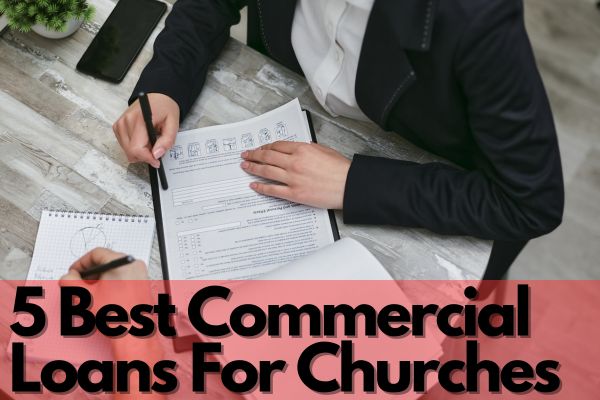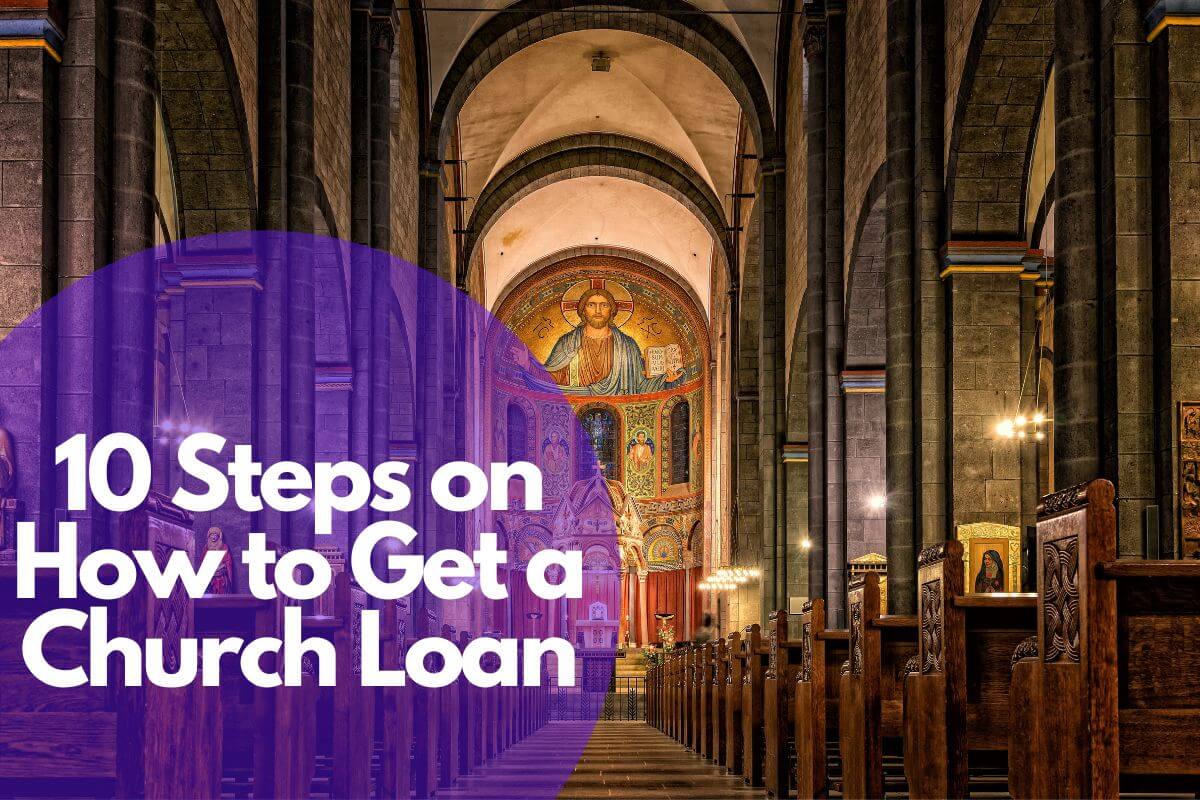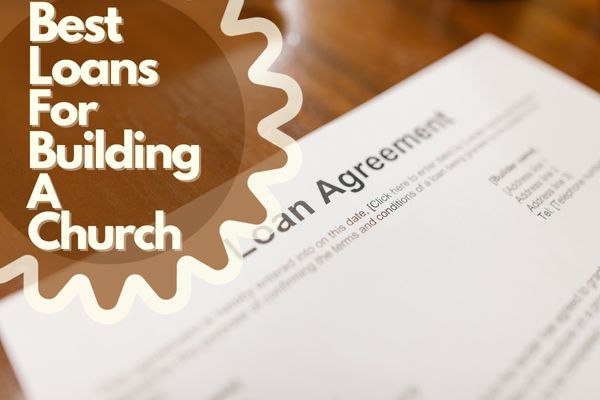Securing the necessary funds to support their operations or pursue growth initiatives can be challenging for many churches.
Fortunately, there are commercial loans specifically designed to meet the unique financial needs of churches. However, with so many options available, it can be overwhelming to determine the best fit for your church.
This article will explore the 5 best commercial loans for churches, including their eligibility requirements, loan terms, interest rates, pros, and cons. By understanding the features of each loan option, you can make an informed decision and secure the funding your church needs to thrive.
5 Best Commercial Loans For Churches
Churches often need financial assistance to support operations, expansion projects, or capital improvements. Commercial loans provide an effective way for churches to access the necessary funds to achieve their goals. Below are five of the best commercial loans for churches:
1. Bank Of America Church Financing
Offers church financing for land purchase, construction, and renovation projects. Eligible borrowers must have a minimum credit score of 660 and provide collateral.
Eligibility Requirements
- A minimum credit score of 660.
- Collateral such as church property, equipment, or cash reserves.
- Personal guarantees from church leaders or members.
2. Celtic Bank SBA 7(a) Loans
Provides SBA loans for churches seeking property acquisition, construction, or renovation funding. Eligible borrowers must have a minimum credit score of 680 and provide collateral.
Eligibility Requirements
- A minimum credit score of 680.
- Collateral such as church property, equipment, or cash reserves.
- Personal guarantees from church leaders or members.
3. Pursuit Church Financing
Offers loans to churches for property acquisition, construction, or renovation projects. Eligible borrowers must have a minimum credit score of 650 and provide collateral.
Eligibility Requirements
- A minimum credit score of 650.
- Collateral such as church property, equipment, or cash reserves.
- Personal guarantees from church leaders or members.
4. Church Extension Plan (CEP) Financing
Provides loans for church construction, renovation, or refinancing existing debt. Eligible borrowers must be affiliated with a CEP member organization and provide collateral.
Eligibility Requirements
- Affiliation with a CEP member organization.
- Collateral such as church property or cash reserves.
- Personal guarantees from church leaders or members.
5.LifeWay Church Financing
Offers loans for church property acquisition, construction, or renovation. Eligible borrowers must have a minimum credit score of 660 and provide collateral.
Eligibility Requirements
- A minimum credit score of 660.
- Collateral such as church property, equipment, or cash reserves.
- Personal guarantees from church leaders or members.
Each loan option has unique features, eligibility requirements, loan terms, and interest rates. Careful consideration of these factors can help churches determine which loan option best fits their needs.
Importance Of Finding The Right Commercial Loan Option For Churches
Finding the right loan option is crucial for churches because it can directly impact their financial health and ability to carry out their mission.
Churches need to ensure that they secure financing with reasonable terms and interest rates that are manageable within their budget.
Additionally, choosing the right loan option can help churches avoid potential risks, such as defaulting on payments, losing collateral, or facing penalties for prepayment.
The right loan option can also give churches the flexibility to pursue their unique goals, such as purchasing land, expanding facilities, or financing equipment.
By finding a loan option that aligns with their needs, churches can position themselves for long-term success and sustainability.
Moreover, churches need to consider the reputation and stability of the lender when choosing a loan option.
A reliable and reputable lender can provide support and guidance throughout the loan application process and offer ongoing assistance to ensure the church can meet its obligations.
Finding the right loan option for churches cannot be overstated. It is crucial to weigh different loan options’ features and eligibility requirements and choose the option that best aligns with the church’s goals and financial situation.
Steps To Applying For A Commercial Loan For Churches
1. Determine Your Needs
Before applying for a commercial loan, you should determine the amount of funding you need, the purpose of the loan, and the repayment terms that will work for you.
This will help you choose the right lender and loan product.
2. Research Lenders
Research and compare different lenders to find one that offers loan products that fit your needs. You can look for lenders online, ask for referrals from other churches, or speak with a financial advisor.
3. Gather Your Financial Information
To evaluate your creditworthiness, lenders will require financial information such as income statements, balance sheets, and tax returns.
You should gather this information and be prepared to provide it when applying for the loan.
4. Submit An Application
Once you have identified a lender and gathered your financial information, you can apply for the loan.
The application will typically include information about the church, the loan amount, the purpose of the loan, and the desired repayment terms.
5. Provide Additional Information
The lender may require additional information, such as collateral or personal guarantees, during the application process. Be prepared to provide any requested documentation promptly.
6. Wait For Approval
After applying, you will need to wait for the lender to evaluate your creditworthiness and determine whether to approve the loan. Depending on the lender, this process may take several days to several weeks.
7. Accept The Loan
If your loan application is approved, you will receive a loan offer from the lender. Be sure to carefully review the terms of the loan before accepting it.
Applying for a commercial loan requires careful preparation, research, and patience. By choosing the right lender and loan product and providing accurate financial information, churches can increase their chances of securing the funding they need to support their operations and achieve their goals.
Benefits Of Applying For A Commercial Loan
1. Access To Funds
The primary benefit of a commercial loan is access to funds that you can use to grow your business. These loans can provide the capital you need to invest in new equipment, inventory, or property.
2. Build Business Credit
When you apply for and repay a commercial loan, you build a positive credit history for your business. This can help you qualify for larger loans in the future and can also improve your business credit score.
3. Tax Deductions
The interest paid on a commercial loan is often tax-deductible, which can help lower your overall tax burden.
4. Flexibility
Commercial loans come in a variety of forms, including lines of credit, term loans, and SBA loans. You can choose the loan type that best suits your business needs.
5. Competitive Rates
Commercial loans typically have lower interest rates than personal loans or credit cards, making them a more cost-effective financing option.
6. Improve Cash Flow
Commercial loans can help improve your cash flow by providing the funds you need to pay for expenses you would otherwise need to cover out of pocket.
7. Retain Control
Unlike other financing options, such as equity financing or venture capital, taking out a commercial loan allows you to retain full ownership and control of your business. You are not giving up any equity in exchange for the funds.
8. Plan For Growth
Commercial loans can provide you with the funds you need to plan for long-term growth. Whether expanding your product line, opening a new location, or investing in marketing campaigns, a commercial loan can help you achieve your business goals.
9. Improve Business Reputation
A successful application and repayment of a commercial loan can improve your business reputation. It shows lenders and potential investors that you are a responsible borrower who can manage debt effectively, opening up additional financing opportunities in the future.
10. Manageable Repayment Terms
Commercial loans come with various repayment terms, allowing you to choose a payment schedule that fits your business needs.
Longer repayment terms may have lower monthly payments, while shorter terms can save you money on interest in the long run.
A commercial loan can be valuable for growing and expanding your business. However, it’s important to carefully consider your options and choose a loan that fits your needs and budget.
Pros Of Applying For A Commercial Loan For Churches
1. Access To Large Amounts Of Capital
One of the biggest advantages of a commercial loan is that it can give your business access to a large amount of capital. This can help your business to grow, expand, and take advantage of new opportunities.
2. Lower Interest Rates
Commercial loans often have lower interest rates than other types of loans, such as credit cards or personal loans. This can save your business a significant amount of money on interest charges over the life of the loan.
3. Flexible Repayment Terms
Commercial loans offer a range of repayment terms that can be customized to your business’s needs. This can include the length of the loan, the frequency of payments, and the ability to make additional payments without penalty.
4. Helps Build Business Credit
Your business can build a positive credit history by taking out and repaying a commercial loan. This can help you qualify for larger loans in the future and better interest rates.
5. Tax Benefits
The interest paid on a commercial loan is often tax-deductible, which can help reduce your business’s tax burden.
6. Retain Ownership And Control
Unlike equity financing, taking out a commercial loan allows you to retain full ownership and control of your business. You do not have to give up equity in your company in exchange for the funds.
Cons Of Applying For A Commercial Loan
1. Collateral Requirements
Many commercial loans require collateral, an asset the lender can seize if the borrower cannot repay the loan. This can put your business assets at risk if you cannot repay the loan.
2. Strict Qualification Requirements
Commercial loans often have strict qualification requirements, such as a strong credit history and a track record of business success. This can make it difficult for newer or smaller businesses to qualify for a loan.
3. Time-Consuming Application Process
The application process for a commercial loan can be time-consuming and require extensive documentation, such as financial statements and business plans.
4. Risk Of Over-Leverage
Taking on too much debt through a commercial loan can put your business at risk of over-leverage, where debt obligations outweigh the ability to generate profits and cash flow.
5. Possible Prepayment Penalties
Some commercial loans may include prepayment penalties if the borrower pays off the loan early. This can make it more expensive to repay the loan ahead of schedule.
https://youtu.be/Xbg0xDNeTME
Conclusion
Finding the right commercial loan for a church is crucial to support its operations, expand its facilities, or investing in new programs. With numerous lenders and loan products available, it can be challenging to choose the right option.
However, churches can find a loan product that fits their unique needs by researching and comparing different lenders, gathering financial information, and carefully reviewing loan terms.
Whether through Bank of America, Celtic Bank, Pursuit, Church Extension Plan, or LifeWay, churches can access the financing they need to achieve their goals and continue serving their communities.






